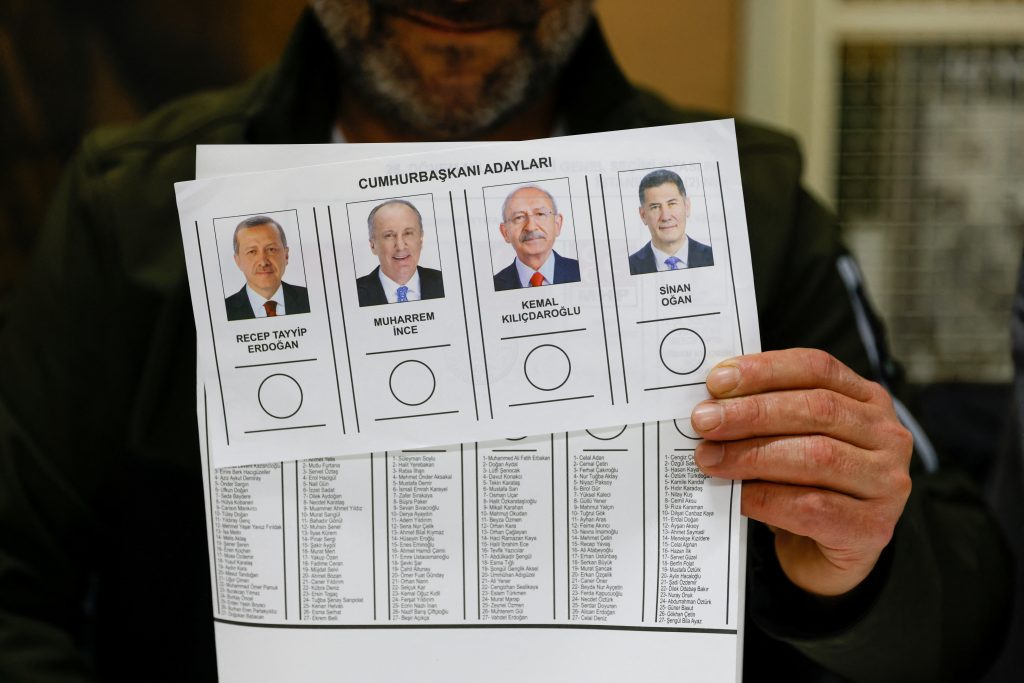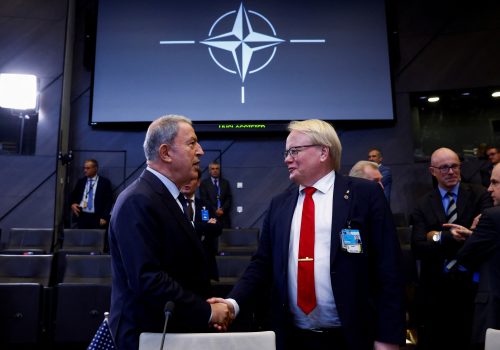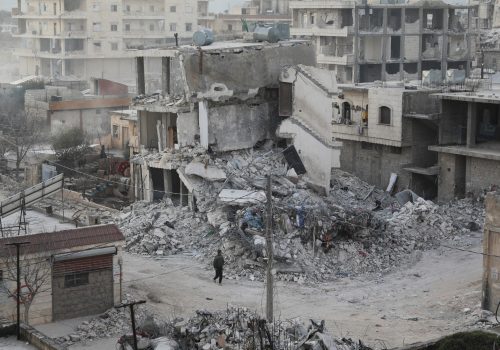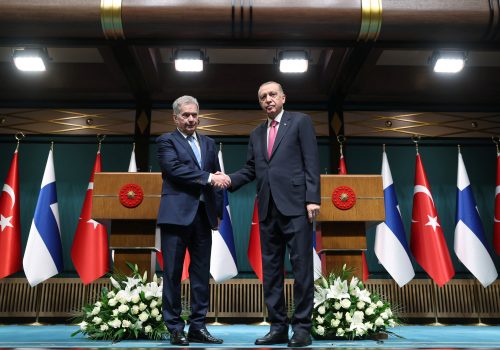They’re going to overtime. With the eyes of the world upon them, neither Turkish President Recep Tayyip Erdoğan nor top challenger Kemal Kılıçdaroğlu was able to reach 50 percent of the vote during the first round of balloting on Sunday—though Erdoğan came close at 49.5 percent. They will now compete in a May 28 runoff. The powerful leader who has governed this pivotal NATO ally for twenty years will face off against a challenger proposing change in a time of economic and geopolitical upheaval. From Ankara to Washington, our Turkey experts are here to dig into the election results and answer critical questions about what’s next.
1. What do the results tell us about the Turkish electorate? What factors are driving their votes?
The outcome was a choice for many Turks between pain tolerance (Erdoğan’s poor economic performance and heavy hand domestically) versus risk tolerance (an ideologically diverse coalition with untested personalities, scant unifying principles other than opposing Erdoğan, and a lot of policy unknowns). A comparison with the 2018 results shows progress for the opposition in a sense—the ruling Justice and Development Party’s (AKP) vote share and parliamentary seats dropped, the Republican People’s Party’s (CHP) share rose, Erdoğan’s vote share dropped over 3 percent—but the opposition also underperformed expectations. Polls prior to the election generally showed Kılıçdaroğlu ahead by several percentage points, and if we tally the 2018 total of opposition candidates (CHP; Good Party, or Iyi; and Peoples’ Democratic Party, or HDP), their 46.33 percent exceeded the 44.45 percent garnered by Kılıçdaroğlu as a unified candidate with ex officio HDP support.
—Rich Outzen is a nonresident senior fellow at the Atlantic Council IN TURKEY and a geopolitical analyst and consultant.
With a turnout of almost 90 percent, the Turkish people proved their commitment to the democratic process. There were, in fact, two elections on May 14: One for the Turkish parliament, Turkey’s legislative organ under a presidential system, and a second one to select the next Turkish president. The results showed an electorate still highly divided, but also showed an increase in nationalist votes. Compared to previous elections, the AKP votes decreased from 43 percent to 35.4 percent. Its alliance partner, the Nationalist Movement Party (MHP), surprisingly protected its vote share, in contrast to pre-election polls. The end result appears to be the People’s Alliance (AKP plus MHP) as the majority group in the parliament, securing 321 seats. This number will be sufficient for a legislative majority, but short of the 360 seats needed to make a constitutional amendment. On the other hand, the main opposition Nation Alliance, led by the CHP and Iyi, secured only 213 seats.
Despite the general expectations, it was surprising to see that the recent economic policies of the government—which led to high inflation, low reserves, and a foreign exchange crunch—were not determinant for those who voted for the AKP. This suggests that the recent economic incentives Erdoğan announced, and nationalist motives combined with Erdoğan’s leadership style, played a bigger role in their votes. The increasing nationalist votes were also reflected in the surprisingly strong showing by third-place presidential candidate Sinan Oğan, who secured 5.3 percent of the vote when pre-election polls projected him only at only 1-2 percent.
As a final note, with the exception of the hard-hit Hatay province in southern Turkey, the recent earthquake in Turkey did not make the expected impact on the electorate’s decision, according to the current results. Again, half of Turkey thinks that securing stability rather than a change will be better for the country.
—Defne Arslan is senior director of the Atlantic Council IN TURKEY program.
Across Turkey, Erdoğan’s vote total in 2023 decreased between 1-5 percent in most provinces compared to the last presidential election in 2018, in which he took 52.6 percent of the vote, enough to avoid a runoff. That modest decline does not match the high hopes of the opposition, buoyed by many but not all polls heading into the election. Despite years of economic struggle and runaway inflation, Erdoğan was able to hold on to the loyalty of most of his base and end up just shy of 50 percent. The results remind us again that the Turkish electorate leans heavily right, with right-wing parties winning over 60 percent of the parliamentary vote. It also hints that the electorate is not convinced in the opposition’s vision for the country or its ability to solve the challenges facing the country. In its campaign, the AKP heavily played on the achievements realized in the past twenty-one years under its rule, from its signature infrastructure projects to health care reforms and defense industry development, which may have resonated with voters more than intangible promises and change promoted by the opposition.
—Grady Wilson is an associate director at the Atlantic Council IN TURKEY.
2. What do you make of the composition of the new parliament, and what impact will it have on the ultimate winner of the presidential race?
Adding up the current numbers as broadcasted by news outlets (no official numbers are out yet), AKP will have 266 seats and CHP will have 169 seats, of which 37 seats actually belong to four other coalition partners. These include political parties led by Ahmet Davutoğlu, Ali Babacan, and Temel Karamollaoğlu. In addition, the Green Left Party (YSP) will have 62 seats, the MHP 50 seats, the Iyi 44 seats, and two others parties with a total of 9 seats. These numbers put the People’s Alliance (AKP plus MHP) at 312 seats and Nation’s Alliance (a CHP-led group of six parties) at 213 seats. These numbers give the majority to the AKP-led alliance.
Two options appear possible for the runoff:
- The Turkish electorate could consolidate around nationalist votes. They may prefer continuity of the current status quo: a president supported by a majority in the parliament.
- Turks can decide it is risky to consolidate too much power around the AKP and consolidate, instead, for Kılıçdaroğlu.
—Defne Arslan
The Turkish electorate remains a center-right electorate. Kılıçdaroğlu did not attract enough of the winnable center-right votes to win and, in my view, that was the key to the outcome. Over 20 percent of the parliament will consist of explicitly nationalist parties (MHP, Iyi, BBP), and Oğan’s surprising 5 percent in the presidential race shows the persistence of anti-Erdoğan nationalist voters who also rejected the primary opposition candidate. It is possible that the more explicit support to Kılıçdaroğlu from the heavily Kurdish HDP, and Erdoğan’s instrumentalization of it by accusing his opponent of being adjacent to the Kurdistan Workers’ Party (PKK) terrorist group, worked by driving some potential nationalist votes from the opposition to Oğan or the MHP.
Despite Western predictions that the Kurds of Turkey would be kingmakers in a tightly divided electorate, it did not pan out that way. The HDP/YSP (sympathetic to the PKK) drew only 8.8 percent, down roughly 3 percent from 2018, and dropped from 67 to 62 parliamentary seats. Even in the Kurdish-majority areas of the southeast, the race was competitive, with Erdoğan’s alliance ahead of the HDP/YSP in half the provinces and the opposition CHP pulling five parliamentary seats while HDP/YSP held roughly half the provinces.
—Rich Outzen
One of the most surprising results from the election is the resilience of the second largest party in the People’s Alliance, the MHP. Once again (as they did in 2018), the MHP surpassed all pre-election predictions, taking about 10 percent of the vote and guaranteeing the People’s Alliance will continue its control of parliament. Meanwhile, the CHP and Iyi underperformed. The results will not help the opposition’s morale going into the runoff.
—Grady Wilson
3. What is your take on allegations of Russian influence in the election?
Despite the fact that foreign policy was almost absent from the agenda of the current Turkish elections, the Russian factor became a major issue in domestic politics just days before the voting with the opposition leader Kılıçdaroğlu saying he had evidence of Russian interference in the upcoming elections. Erdoğan denied the accusations and added that cooperation with the Russian Federation was no less important for Turkey than with the United States. Though no evidence of Russian meddling has been shared so far, Moscow’s influence on the Turkish domestic politics may go far beyond deep fakes and cyber-attacks in the aftermath of the voting when the newly elected Turkish president will have to deliver on electoral promises, pay for Russian gas, get to the negotiation table with the Assad regime, and stabilize the economic situation. Whatever the name of the president, Russia is likely to remain a major factor in Turkey’s foreign and domestic politics.
—Yevgeniya Gaber is a nonresident senior fellow at the Atlantic Council IN TURKEY, a Ukrainian foreign-policy expert, and a nonresident senior fellow at the Center in Modern Turkish Studies at the Norman Paterson School of International Affairs at Carleton University.
4. What is your expectation for the second round given that the first round showed Erdoğan with a significant lead?
There was a negative market reaction to results this morning, Turkish credit default swaps, which are an indicator of the country’s economic risk, rose by 70 basis points to 576. The Turkish lira depreciated despite the controlled foreign exchange markets. The Turkish stock exchange fell, too, led by banking sector stocks—after a significant jump last week in expectation that the opposition, which promised to deliver more conventional economic policies supported by structural reforms, would win. The market reaction might have been more severe if there were more foreign investors in Turkish markets, but there are very few now. The outcome shows that if current economic policies continue, then Turkey will continue to suffer from reserve losses and a high inflation rate, which is no longer sustainable. For this reason, we might now expect to see a shift in Erdoğan’s rhetoric toward new economic policies, while also increasing his tone to attract nationalist votes.
—Defne Arslan
In the absence of any major unforeseen developments, it is very difficult to see Kılıçdaroğlu making up the difference in the second round. He would essentially need 90 percent of the vote that went to Oğan, who took 5.3 percent of the vote.
—Grady Wilson
What did come as a surprise to many is an unexpectedly high level of support for the third-place candidate, Oğan, who has built his electoral campaign on nationalistic and anti-migrant rhetoric. Having gained more than 5 percent of the votes, he has turned from a marginal outsider to a joker with a trump card for the runoff as both front-runners fell short of the support required to win the election in the first round. As both Erdoğan and Kılıçdaroğlu will try to mobilize constituencies for the May 28 voting, it is the voters of Oğan—Turkish nationalists with largely anti-Western sentiments but supportive of the parliamentary system in Turkey—who may play the decisive role. The unexpectedly high level of support for the nationalistic MHP aligning with the ruling AKP party adds to the feeling that observers may have underestimated the level of anti-immigrant sentiments in a Turkish society that is hosting more than 4.5 million Syrian refugees amidst a deep economic crisis.
—Yevgeniya Gaber
Turkey has had an impressive, though for the West disappointing, exercise in democracy. The verdict—pending completion of the second round—seems to have been “better the devil we know.” Erdoğan’s attempts to sow doubt about Kılıçdaroğlu’s proximity to PKK-adjacent Kurds, his lack of international expertise (the CHP leader does not speak English or have foreign-policy experience), and his deference to Atlanticism seems to have worked. Erdoğan’s distribution of pre-election money and promises seems to have worked, as well.
Kılıçdaroğlu was an unimpressive campaigner, though a thoroughly decent man. His coalition proved too scant on policy details, proved vulnerable to charges of being weak on security and not ready for prime time. Worst-case scenarios of obvious cheating or civil unrest seem not to have materialized. The Turks have affirmed their essentially risk-averse and conservative outlook embodied in the statement “böyle geldi, böyle gider” (as it came, so also will it go).
—Rich Outzen
Further reading
Tue, Apr 4, 2023
How to close the gap between Turkey and Sweden on NATO enlargement
TURKEYSource By Grady Wilson, Pınar Dost
Turkey is not yet ready to greenlight Sweden's NATO accession but significant progress has been made. Here's a possible outline of a compromise.
Fri, Mar 17, 2023
Turkey and Syria’s devastating earthquakes send a reminder to the world: Don’t leave Syrians behind
TURKEYSource By Pınar Dost
The disastrous earthquakes have brought the forgotten fate of Syrians and of Syria to the forefront of the US agenda in the region. They must not be forgotten again.
Sat, Mar 18, 2023
Experts react: Turkey moves to approve Finland’s NATO membership. Where does that leave Sweden?
New Atlanticist By
After Turkish President Recep Tayyip Erdogan said he would approve of Finland's membership in NATO, our experts break down what's next.
Image: A person holds the ballot at a polling station during the presidential and parliamentary elections, in Istanbul, Turkey May 14, 2023. REUTERS/Kemal Aslan



